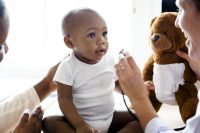Diagnosing Cystic Fibrosis in Newborns

Cystic fibrosis is a disorder that causes severe damage to the lungs and digestive system. Early detection can make a big difference in the treatment of this life-threatening condition. Doctors routinely screen newborns for cystic fibrosis using a blood test that checks for abnormally high levels...




